|
|
| |
| EVENTS |
|
|
> Challenges before Pakistan
|
| |
|
A Discussion with Mr. Stephen P Cohen
January 29, 2005
PILDAT Offices, Lahore
|
|
| |
|
|
|
Introduction
|
|
Mr. Stephen Philip Cohen, Senior Fellow, Foreign Policy Studies
Program, Brookings Institution, USA, shared his thoughts on the topic
of �Challenges before Pakistan� in the light of his recent book �The
Idea of Pakistan,� at a discussion of select group of intellectuals and
academics organised by PILDAT on January 29, 2005.
|
|
The participants of the discussion included Senator S. M. Zafar, Chairman Senate Functional Committee on Human Rights and PILDAT Board of Advisors, Dr. Hasan-Askari Rizvi, Renowned Defence and Political Analyst and Member PILDAT Board of Advisors, Mr. Mujib-ur-Rehman Shami, Editor-in-Chief Daily Pakistan and Member PILDAT Board of Advisors; Mr. Sartaj Aziz, Vice Chancellor Beaconhouse National University and Former Federal Minister for Foreign Affairs and Finance; Sardar Ayaz Sadiq, MNA (PML-N); Mr. Irshad Ahmad Haqqani, Columnist and Resident Editor Daily Jang; Mr. Shafqat Mahmood, Former Senator and Provincial Minister; Maj. Gen. (retd.) Sikandar Shami, Director General NIPA, Lahore;
Lt. Gen. (retd.) Javed Hassan, Principal, Administrative Staff College, Lahore; Prof. Rasool Bakhsh Raees, Political Science Dept, LUMS; Dr. Umbreen Javaid, In-charge Dept of Political Science, Punjab University; Mr. Brian Heath, Principal Officer, American Consulate; Mr. Brian George, Vice Consular, American Consulate and Mr. Rex Moser, Public Affairs Officer, American Consulate.
|
|
At the beginning of the discussion, Mr. Ahmed Bilal Mehboob, Executive Director PILDAT, thanked Mr. Cohen for his participation and presence in the discussion. He briefly introduced PILDAT highlighting that it is an independent research and training institution dedicated to strengthening democracy and democratic institutions in Pakistan. Mr. Mehboob invited Mr. Cohen to share his thoughts on the topic after which a general discussion on the issue could follow.
|
|
Introduction of the Speaker
|
|
Mr. Stephen Philip Cohen is a Senior Fellow in the Foreign Policy Studies Program at the Brookings Institution, USA. He is the author of the widely praised �India: Emerging Power� (Brookings, 2001). He was a member of the Policy Planning Staff of the U.S. Department of State and before joining Brookings, was a faculty member at the University of Illinois, USA.
|
|
Views by Mr. Stephen Philip Cohen
|
|
Mr. Stephen Philip Cohen began his talk by praising PILDAT and said
that organizations like PILDAT in Pakistan actually contribute to
the optimistic feeling about Pakistan in his recent book that make
one take the view of glass half-filled instead of pessimism. He said
that he was impressed by the quality of research and other work done
by PILDAT and also quoted it in his recent book. He believed that in
his capacity as a researcher on Pakistan, he was willing to
cooperate with and support the work of PILDAT in any way possible.
Moving to the topic of �Challenges before Pakistan,� he said that he
will base his talk on presenting his ideas on Pakistan�s Possible
Futures that he has outlined in chapter 8 of his book, after which
he would look forward to a discussion on the topic by the fellow
participants.
Terming it as his toughest book to complete, Mr. Cohen said that he
had begun work on the book a year before 9/11, but it took four
years to complete due to changing scenario after the coup d'�tat in
Pakistan and the changing US involvement with the country. The title
of the book �Idea of Pakistan� was given by Strobe Talbot, he said.
Primarily written for the policy-making circles in the United
States, the book also has subsequent Pakistani and Indian editions.
Indians, he felt, dangerously misunderstand Pakistan and he is
blamed as being too pro-Pakistan in India while it is the other way
round in Pakistan.
As a researcher, he believed, he did not want to write a book that
only just commented on the present-day scenario in Pakistan but one
that has the capacity to look at the possible futures for 5-8 years
down the road. He quipped that he had earlier planned to attach a
percentage of likelihood with each of the possible futures but
refrained from it when the percentages added up to 150%.
The first and the most likely scenario, the chances for which are
around 40-50%, is that there will be a continuation of present
establishment-dominated oligarchic system in Pakistan. However,
major issues in such a scenario are demography, deteriorated
education system and sectarian violence. In this scenario, political
and strategic impact is that establishment searches for external
alliances, there is a likelihood of little movement in relation to
India while nuclear and missile production will continue despite
weak economy.
The second possible scenario, for which there are only about 10%
chances, is that a liberal and secular democracy is established in
Pakistan. In this scenario, democracy could happen, but is likely to
be unstable but more likely to revert to military rule, or to
Islamist or personalistic system. Its political and strategic impact
could include possible clampdown on sectarian terrorism, fresh
effort at accord with India, somewhat more accommodating policy on
nuclear weapons, but no disarmament.
The third possible scenario is of soft authoritarianism in which
emergence of an authoritarian party, probably led by a charismatic
leader, civilian or military, may take place. He termed this
scenario to the possible rise of a benign Zia or Bhutto. However, he
added, in his analysis, military or civil society did not appear
capable of producing a charismatic leader at present. In any case,
if such a scenario did emerge, it is not likely to be sustainable.
Such a scenario may include continuing conflict of Pakistan with
neighbours, greater human rights violations, possible rise of
Islamist or democratic revolutionary forces, etc. He, however, felt
that Pakistanis, by nature, do not have a taste for autocratic
rulers.
The fourth possible scenario is that of the rise of an Islamist
state in Pakistan, of which too there are about 10% chances, he said. This
scenario could be between a soft Malaysia or a hard post-revolution
Iran. This could more likely be a modified Ziaist regime, a
military-civilian coalition glued together by Islamist doctrine,
with the military as the senior partner and could lead to a possible
end of commitment to parliamentary democracy and a probable
imposition of martial law. Its impact could include more open
support of freedom-fighters, more visible and threatening use of
nuclear weapons and possible strategic alliance with Saudi Arabia
and Pakistani military presence in Gulf. Such a scenario and its
likelihood, added Mr. Cohen, is the biggest fear in Washington which
is encouraged by the Pakistani Govt. He, however, believed that this
scenario could only emerge if Musharraf regime fails, and the regime
following him also fails.
The fifth scenario could emerge that of a divided Pakistan in the
eventuality that Army loses control over Pakistan which could only
happen if it is divided up from inside but he did not see a
possibility of that. The division of Pakistan may come about through
several routes but all seem likely. Secessionist movements will only
gain force and momentum if Army weakens up. This scenario could
result in great danger of loose nukes, balkanization of rump
Pakistan and intervention of foreign governments. He however termed
this scenario as highly improbable with a very weak percentage of
possibility attached to it.
The final likely scenario could be of post-war Pakistan. It could
theoretically happen by accident or design, given the nascent state
of Indian and Pakistani nuclear programs, or might come about
through an escalation process. Mr. Cohen believed that Indians are
planning a major series of continuing crises for Pakistan. The odds
of a major war are in inverse proportion to the stability of the
leadership in both India and Pakistan and the willingness of
outsiders to manage regional conflict situations. Impact of such a
scenario could include nuclear exchange that could end the modern
state of Pakistan in minutes; a long drawn-out war might also ruin
it. The rest of the world would be traumatized by any use of nuclear
weapons and would certainly intervene, if possible.
Mr. Cohen believed that in his vision one of these scenarios or a
combination of these scenarios could hold true for the possible
future of Pakistan.
|
|
Discussion
|
|
In the ensuing discussion, all participants presented their ideas on
the possible challenges before Pakistan while commenting on the
ideas put forth by Mr. Stephen Philip Cohen.
Beginning the discussion, Prof. Rasool Bakhsh Raees commended the
insight of Mr. Stephen Cohen and said that he believed friends of
Pakistan should support strengthening of democracy in Pakistan and
not delay it due to a variety of reasons that are offered such as
lack of literacy, weakness of civilian politicians and political
parties etc. He said that he disagreed with the notion that Pakistan
and its people weren�t ready for democracy.
|
|
Mr. Shafqat Mehmood said that one of the dangerous and understudied
issues was the resentment of provinces against a predominantly
Punjabi Army and the feeling in NWFP against operations in Wana area
in NWFP and the Balochi population�s feelings against the extraction
of natural resources and changes in their demography. These, he
termed, were a grave issue confronting Pakistan and the present
military regime and had serious potential of a real crisis. Agreeing
with him, Mr. Cohen said that at his level of generalisation in the
book, he had not covered it in detail but the feelings of alienation
in provinces were a grave threat to the country and its federation.
Expressing his views, Mr. Sartaj Aziz said that the advice to
American policy makers that democracy and its strengthening are the
foremost areas they should support has not been given its due
priority in the book. In the context of India, which was not a
homogenous nation, Indian leadership realised that the only
sustainable way of keeping their country intact was democracy and
that centralised leadership was disastrous. Indian constitution from
the start recognised diversity of groups and recognised regional
languages as national. Indian Muslims today are worse off than
average Hindu in India and only those Indian Muslims become success
stories who are ready to forego their Muslim outlook and inter-marry
etc.
In the case of Pakistan, he said, everyone agrees that the best
martial law in terms of economic growth was of Ayub Khan�s but that
too resulted in the secession of East Pakistan. Gen. Zia-ul- Haq�s
martial law resulted in emerging of nationalist and secessionists
movements in the country which died down even with a fa�ade of
democracy after 1985 elections. Military rule, by its very nature, weakens the very
democratic institutions because it stops their growth.
Another issue is, said Mr. Aziz, that Pakistan suffers from global
fault lines and is in a way a melting pot of global fault lines.
Russian invasion resulted in the rise of Jehadi culture in Pakistan.
Palestinian problems too results in displaced groups to find a safe
haven and establish themselves in a poorly-governed Pakistan.
Eventually, he believed, Pakistan is blamed for all of this. In fact
it should not only be compensated for all of this but western powers
should also accept their part of the blame in creating such
situations.
Indian dimension of the problem also complicates the issue, said Mr.
Sartaj Aziz. Pakistan has a hostile neighbour in the shape of India
and to safeguard its territory and ensure its security, it has to
spend on defence in large proportions, though not to the percentage
that India spends. World, however, is totally oblivious to the
security problem of Pakistan, he added.
Mr. Aziz also quipped that it is too much of a consequence that each
time United States needs Pakistan there is a military government
here. If the military believes civilians are not good enough to run
institutions, the logical conclusion will be to build civilian
institutions but that is not done. Avenues of civil military
interactions are required in Pakistan but the present National
Security Council is just a way to ensure military supremacy and will
be wound up as soon as the present regime goes, he added.
In response, Mr. Cohen said that he has discussed in the book that
the US Ambassador in Pakistan is almost like a cabinet minister,
although in most of his discussions with former ambassadors, he was
told that they were involved into internal affairs of Pakistan
despite their wish to stay out of those. It is a misfortune, he
added, that amongst Pakistan�s allies, United States is the only
country that presses for democracy as Saudi Arabia and China have
democracy as least of their concerns.
As for condition of Indian Muslims, he said that he had not seen an
empirical study that average Indian Muslim did worse than a Hindu in
India. In Pakistan too there are a lot of groups and communities who
have not enjoyed equal opportunities of growth. The tragedy in
Indian Gujarat strengthens the idea of Pakistan. It is however one
of the strengths of Indian systems that there are attempts towards
enquiry of the incident, he added.
Ms. Umbreen Javaid said that despite military rule in country,
governance was not improved. Ordinary person in Pakistan does not
trust US and the continuity of its support towards Pakistan while it
is felt that US policies in the region are pro-India. Mr. Cohen said
that Indians complained of a pro-Pakistan tilt in US policy. US
policymakers do not view of their policy towards the region as a
balancing act. US policy looks at its own interest with both
countries. The policy is not pro-active but if there were a crisis,
US would be involved in diffusing it. Policy makers in US only look
for outside help of scholars or think-tanks in United States when
there is an extra-ordinary requirement to do that and under normal
circumstances, State Department and Pentagon etc. consider
themselves to be capable of conceiving and running a policy, he
said. He believed that instead of the current policy, US policy
should be pro-active in the region. Indians do not want US
involvement in this regard but only want US pressure against
Pakistan to achieve their own ends, he added.
Mr. Mujib-ur-Rehman Shami enquired that Mr. Cohen�s book said
Pakistan could not progress without a supportive US and a tolerant
India but did he see India as being tolerant? In response, Mr. Cohen
said that India would love to have a Western Bangladesh and a weak
government, but a nuclear weapon in Pakistan has served as a
deterrent against that wish. Thoughtful Indians are looking towards
normalising relations with Pakistan. Unfortunately, he added, the
current Congress Government does not have a single person who is
sympathetic towards this cause. He said that Indian press quoted him
by writing that Pakistan India talks were doomed and he agreed with
that. In his view the opportunity for talks has passed. He also did
not see future governments in India wanting to negotiate peace with
Pakistan. Present Indian policy towards talks is so tedious it is
like watching paint dry, he said, so he did not see any real result
emerging from it. At best the efforts already undertaken in this
area such as cricket matches etc may serve as a foundation of some
normalising of relations between the two countries.
Sardar Ayaz Sadiq said that Gen. Musharraf and United States had a
lot in common as both let the people of Pakistan down after they had
put their trust in them. He said that the likelihood of nuclear
technology going into the hands of Islamists or terrorist groups in
case present regime goes was nil as the military had the capacity to
defend Pakistan�s nuclear arsenal.
Mr. Cohen said that Pakistan has been too dependent on United States
and he had always felt this should not be the case. But dependence
on others appears to be adopted by design in Pakistan�s policy. On
the issue of uniform, he said that he never expected Gen. Musharraf
to take off his uniform as he promised. But he should have a
time-table that he should take the political leadership in
confidence on. Military�s retreat from political arena has to be
phased, he added and he hoped that the current regime had an exit
strategy and a plan to do so that it must share with politicians.
Politicians should also ensure that they have no vengeance against
generals for them to feel confident to step out. There is a need for
a Reconciliation Commission and a dialogue between civil-military on
the pattern of South Africa. PILDAT is in ideal position to do it,
he added.
Lt. Gen. (retd.) Javed Hassan said that he sensed the vibes in the
room that Army has Bonapartist tendencies and what was Mr. Cohen�s
view on it? Mr. Cohen believed that some individuals in Army may
have great ideas to be the saviour but overall he did not think
Pakistan Army had the tendency. The real issue, however, was of the
utter contempt Army had for civilians and what they thought were the
incompetence of the civilians to run the affairs of the country. No
real movement forward on Army�s role away from politics could take
place unless a deeper understanding in the Army is cultivated that
civilians are the only people capable of running the affairs of the
country, he said.
Maj. Gen. (retd.) Sikandar Shami said that some analysts believe
that what is happening in Wana and in Balochistan may be the result
of US involvement. Mr. Cohen said that it may be true but he could
think of other countries who would want to inflame forces such as
Balochi Liberation organisations. Maj. Gen. (retd.) Shami also urged
Mr. Cohen to read Urdu press in Pakistan to understand the country
better as it was more representative of a vast population and
readership�s views.
Dr. Askari said that there has been a recent study in the US about
the possibility of threat of nuclear weapons going into terrorist
hands but such a possibility was ruled out in the result of the
study. However, the study said that security lapses through the
collusion of insiders and outsiders may result in some radio-active
material going outside. He also agreed with Mr. Cohen on the
probability that the current scenario may continue but argued that
economic issues and problems of ethnicity may explode. Another
threat to this could be the blow-back of Pakistan�s role in Kashmir
and Afghanistan. He also felt that a linkage to Iraq in terms of
exit-strategy of US from Iraq and its involvement with Afghanistan
will also have its consequences for Pakistan.
Mr. Cohen agreed with Dr. Asakari�s analysis and added that he
deeply regretted the timing of US invasion of Iraq simply because it
amounted to neglecting the situation in Afghanistan. He agreed that
there will be likely implications of US foreign policy in this
region.
Participants also believed that US will have a stronger relationship
with Pakistan if it dealt with a political government rather than an
individual. There was concern on the growing corporate role of army
in the country. Mr. Cohen recognised that the opening of media and
its freedom in Pakistan was a positive sign.
In the end, Senator S. M. Zafar said that Pakistani society,
temperamentally, was democratic which is why after every
dictatorship, it returns to democracy. He thanked Mr. Cohen for his
time, sharing of his views and his ideas. Senator Zafar, alongside
PILDAT Executive Director and Joint Director, also presented Mr.
Cohen with a PILDAT memento to commemorate his visit to PILDAT.
|
|
|
| |
|
|
| |
|
|
| |
|
|
| |
|
|
| |
|
|
| |
|
|
| |
|
|
| |
|
|
| |
|
|
| |
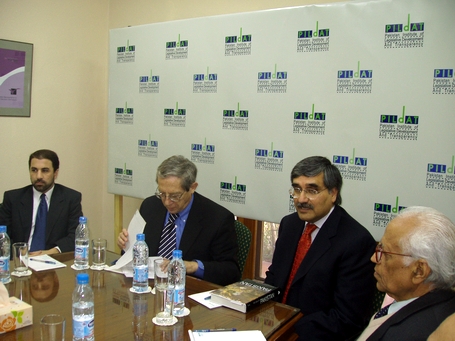
|
|
| |
|
|
| |
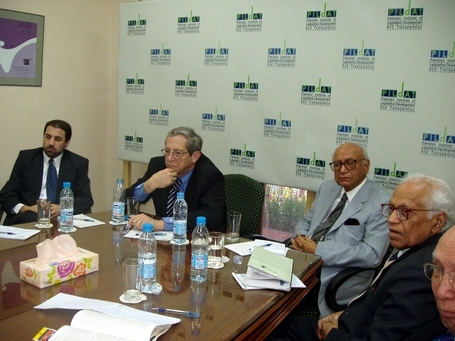
|
|
| |
|
|
| |
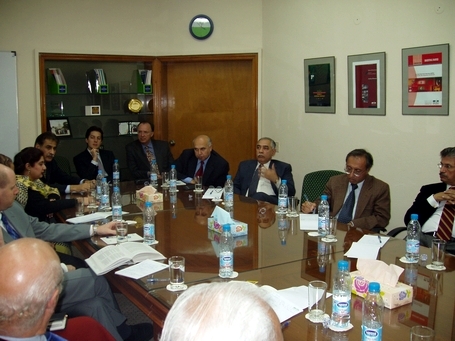
|
|
| |
|
|
| |
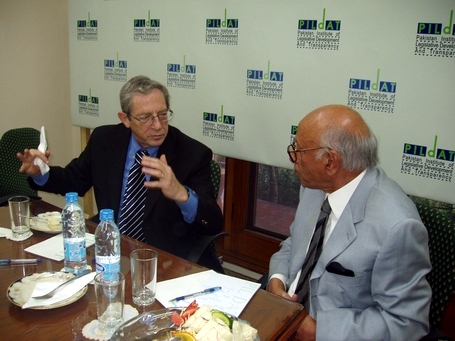
|
|
| |
|
|
| |
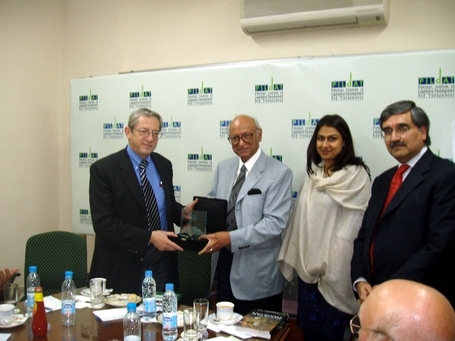
|
|
|
|
|
|
|
|
|